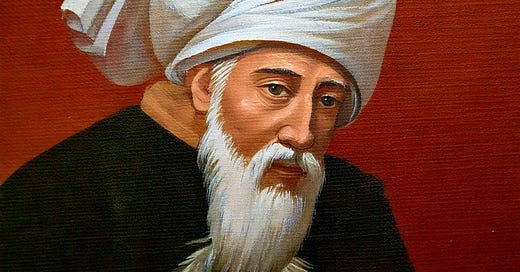Love, Forgiveness, and Unity: Parallels Between Rumi and A Course in Miracles
Rumi, the 13th-century Persian poet and mystic, and A Course in Miracles (ACIM), a modern spiritual text, are separated by centuries and cultural contexts, yet their teachings share deep similarities. Both emphasize the power of love, forgiveness, and the importance of transcending the ego to achieve inner peace. Let’s explore how Rumi’s poetry and ACIM’s principles overlap in their approach to spirituality, self-understanding, and the journey to divine connection.
Transcending the Ego
One of the foundational messages of A Course in Miracles is that the ego creates an illusion of separation from God and others, which leads to fear and suffering. According to ACIM, real peace and happiness can only be found by letting go of the ego and embracing our divine nature.
Rumi’s poetry often speaks to this same theme. He describes the ego as a veil that must be lifted to experience the divine. In his verses, Rumi portrays the ego as an obstacle on the spiritual path, creating illusions that cloud our perception of God. For instance, he writes, “You are not a drop in the ocean; you are the entire ocean in a drop.” This imagery reflects ACIM’s idea that our true nature is not limited by the ego’s sense of separateness, but is instead boundless and connected to all.
The Power of Love
Both Rumi and A Course in Miracles regard love as the ultimate truth of existence. In ACIM, love is the only reality, and fear is considered a distortion created by the ego. By choosing love over fear, one aligns with the divine and experiences unity.
Rumi’s poetry famously explores the theme of divine love, often portraying God as the Beloved with whom he longs to unite. For Rumi, love is not just an emotion but the essence of God and the driving force of the universe. His words, “I am yours. Don’t give myself back to me,” convey his desire to dissolve his ego into love, echoing ACIM’s invitation to let go of the personal self and embrace unity with the divine.
Forgiveness as a Path to Inner Peace
Forgiveness is central to A Course in Miracles, which teaches that by forgiving others, we recognize their inherent innocence and, in doing so, free ourselves from guilt and suffering. ACIM views forgiveness as a means to release the mind from the ego’s grip and return to a state of love and peace.
Rumi’s poetry similarly extols forgiveness as a way to overcome the pain of separation. In one of his well-known quotes, he says, “Out beyond ideas of wrongdoing and rightdoing, there is a field. I’ll meet you there.” Here, Rumi suggests that transcending judgment allows for a higher, unconditional love that leads to spiritual freedom—aligning closely with ACIM’s principles of forgiveness and the idea that true peace lies beyond judgment.
Inner Peace Through Surrender
ACIM emphasizes that true peace can only be attained by surrendering personal will to divine guidance. This surrender, which ACIM calls the “Atonement,” allows individuals to align with God’s will rather than their own desires, which are typically ego-driven.
Rumi expresses a similar philosophy through his concept of “fana” or annihilation of the self, where one surrenders entirely to the Beloved. In one of his poems, he advises, “Close your eyes, fall in love, stay there.” This surrender of the self reflects ACIM’s teaching that only by relinquishing personal control can one find true freedom and peace.
Spiritual Journey as a Return to God
In ACIM, the spiritual journey is portrayed as a path back to God, recognizing that the separation from Him is only an illusion created by the ego. The journey is one of remembrance, where individuals wake up to their divine nature and reconnect with the truth of love.
Rumi also speaks of the spiritual journey as a return, saying, “I have been a seeker and I still am, but I stopped asking the books and the stars. I started listening to the teaching of my soul.” For Rumi, the journey involves turning inward and reconnecting with the divine spark within, echoing ACIM’s view that God is found within each of us.
A Shared Path to Divine Love
While Rumi and A Course in Miracles are from different eras and cultures, their teachings share a common spiritual foundation. Both encourage a move beyond the ego to experience unity, love, and peace and describe the journey as a return to our true divine nature. The resonance between Rumi’s mystic poetry and ACIM’s principles provides seekers with complementary insights into the transformative power of love, forgiveness, and surrender on the path to enlightenment.




